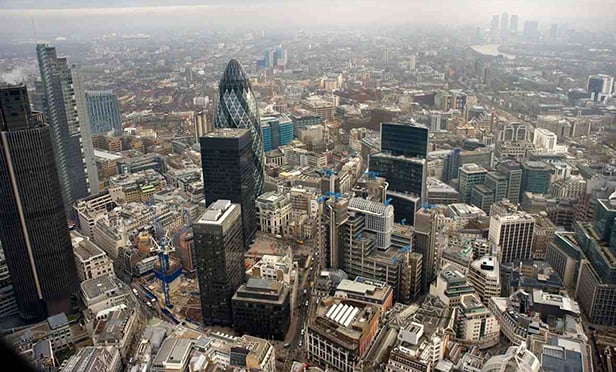Half of London's biggest law firms believe artificial intelligence tech will lead to job cuts
Law firm real estate report finds finds concerns over AI impact as firms shrug off Brexit blues
April 24, 2018 at 04:31 AM
5 minute read
Almost half of the largest law firms in London are expecting to see job cuts as a result of the increasing use of artificial intelligence (AI) technology, according to new research.
Between 43% and 45% of law firms surveyed by commercial property company CBRE said they believed there will be a reduction in headcount at junior and support levels due to firms' adoption of AI, with 5% of respondents saying they expect cuts of more than 20%.
The finding is part of CBRE's annual report on law firm real estate in London, which surveys those with the largest footprint in the capital.
Of the firms surveyed, 89% either use AI already or plan to do so in future. Sixty-three percent said they use AI for legal document generation and review or e-discovery, with 47% using it for due diligence and 42% for research.
While job cuts spurred by the increased take-up of technology are likely, Kennedys innovation head Richard West suggested these roles could be replaced by new positions within law firms. "The question of how headcount will be affected is complex and, of course, technology is likely to result in attritional work and roles falling away from the traditional legal services model," he said.
"However, it is too early to say that there will not be other roles to replace them. New roles are developing as technology encroaches on the attritional space. They include data scientists, those working on AI and predictive analytics, as well as legal services software developers."
Frances Warner Lacey, senior director in the central London tenant advisory group at CBRE, commented: "Our study found considerable uncertainty around the impacts of AI on employment, reflected by over 30% who were unsure of the potential impact at each level. This will make formulating a dynamic real estate strategy, to cope with these structural changes to the sector, particularly problematic for law firms."
The report found that office take-up by the legal sector in 2017 was 21% below the 10-year average at 592,100 sq ft, despite high-profile deals such as Freshfields Bruckhaus Deringer's 255,000 sq ft pre-let for its new London headquarters at 100 Bishopsgate.
In contrast to the widespread concerns over the impact of AI, the majority of firms surveyed for the report said the UK's exit from the European Union would have no effect on headcount or profitability. Seventy-two percent said Brexit would have no impact on employment levels, while 59% were confident that it would have no impact on London profitability, and a further 36% said it would only have a minor impact.
Despite a number of major firms – such as DLA Piper and Pinsent Masons – looking towards Ireland as a Brexit hedge, 70% of firms said they had no contingency plan to relocate businesses from the UK to elsewhere in Europe due to Brexit. Only 16% said they were aware of their firm having such a plan in place,
The report also found that agile working policies have doubled in take-up since last year, with 61% of firms having adopted an agile working policy this year, compared to 30% in 2017. Ninety-seven percent of respondents said their agile working policies allowed staff to work from home, with 82% providing the technology to enable them to work away from their desks.
DAC Beachcroft managing partner David Pollitt, whose firm is currently seeking new office space, said he plans to introduce an "agile platform", a move he says is about establishing a modern way of working that "creates a space that belongs to everybody, not individuals".
He said: "Gone are the days that people want a space of their own in a firm's office. Agile working is about having a modern, flexible environment where people are not chained to a desk. It creates a far better working environment and there is also a wellbeing factor that should not be underestimated."
The report also ranked the top 100 firms in London based on their floorspace in the capital, with Clifford Chance and Allen & Overy leading the table. Magic circle firms Linklaters and Freshfields placed third and fourth, with Herbert Smith Freehills, Hogan Lovells, Slaughter and May and CMS Cameron McKenna also appearing in the top 10.
In total, these 100 firms occupy almost 10 million sq ft, and spend a total of £495m per year on rent, up 6.2% from 2013. The average cost of real estate per sq ft has risen almost 14% from £43.51 five years ago to £49.41 this year.
Click here to download the full report.
- Artificial intelligence will be under the spotlight at this year's Strategic Technology Forum, which will take place in Italy this June. Other subjects on the agenda include the law firm of the future, the war for tech-savvy millennial talent, and how to react to a public hacking. Click here for more information.
This content has been archived. It is available through our partners, LexisNexis® and Bloomberg Law.
To view this content, please continue to their sites.
Not a Lexis Subscriber?
Subscribe Now
Not a Bloomberg Law Subscriber?
Subscribe Now
NOT FOR REPRINT
© 2025 ALM Global, LLC, All Rights Reserved. Request academic re-use from www.copyright.com. All other uses, submit a request to [email protected]. For more information visit Asset & Logo Licensing.
You Might Like
View All
Top Labor Lawyer and Former Germany Managing Partner Leaves A&O Shearman to Found Boutique Firm
3 minute read
Noerr’s Former Polish Office Merges With Big Professional Services Firm Eying German-Speaking Clients
3 minute read
US-Based Smith, Gambrell & Russell Expands to Italy With Cross-Border Transactional Attorneys
3 minute readTrending Stories
- 1Newsmakers: Former Pioneer Natural Resources Counsel Joins Bracewell’s Dallas Office
- 2Quiet Retirement Meets Resounding Win: Quinn Emanuel Name Partner Kathleen Sullivan's Vimeo Victory
- 3Avoiding the Great Gen AI Wrecking Ball: Ignore AI’s Transformative Power at Your Own Risk
- 4A Lesson on the Value of Good Neighbors Amid the Tragedy of the LA Fires
- 5Change Is Coming in the Trump Era. For Big Law, Change Is Already Here
Who Got The Work
J. Brugh Lower of Gibbons has entered an appearance for industrial equipment supplier Devco Corporation in a pending trademark infringement lawsuit. The suit, accusing the defendant of selling knock-off Graco products, was filed Dec. 18 in New Jersey District Court by Rivkin Radler on behalf of Graco Inc. and Graco Minnesota. The case, assigned to U.S. District Judge Zahid N. Quraishi, is 3:24-cv-11294, Graco Inc. et al v. Devco Corporation.
Who Got The Work
Rebecca Maller-Stein and Kent A. Yalowitz of Arnold & Porter Kaye Scholer have entered their appearances for Hanaco Venture Capital and its executives, Lior Prosor and David Frankel, in a pending securities lawsuit. The action, filed on Dec. 24 in New York Southern District Court by Zell, Aron & Co. on behalf of Goldeneye Advisors, accuses the defendants of negligently and fraudulently managing the plaintiff's $1 million investment. The case, assigned to U.S. District Judge Vernon S. Broderick, is 1:24-cv-09918, Goldeneye Advisors, LLC v. Hanaco Venture Capital, Ltd. et al.
Who Got The Work
Attorneys from A&O Shearman has stepped in as defense counsel for Toronto-Dominion Bank and other defendants in a pending securities class action. The suit, filed Dec. 11 in New York Southern District Court by Bleichmar Fonti & Auld, accuses the defendants of concealing the bank's 'pervasive' deficiencies in regards to its compliance with the Bank Secrecy Act and the quality of its anti-money laundering controls. The case, assigned to U.S. District Judge Arun Subramanian, is 1:24-cv-09445, Gonzalez v. The Toronto-Dominion Bank et al.
Who Got The Work
Crown Castle International, a Pennsylvania company providing shared communications infrastructure, has turned to Luke D. Wolf of Gordon Rees Scully Mansukhani to fend off a pending breach-of-contract lawsuit. The court action, filed Nov. 25 in Michigan Eastern District Court by Hooper Hathaway PC on behalf of The Town Residences LLC, accuses Crown Castle of failing to transfer approximately $30,000 in utility payments from T-Mobile in breach of a roof-top lease and assignment agreement. The case, assigned to U.S. District Judge Susan K. Declercq, is 2:24-cv-13131, The Town Residences LLC v. T-Mobile US, Inc. et al.
Who Got The Work
Wilfred P. Coronato and Daniel M. Schwartz of McCarter & English have stepped in as defense counsel to Electrolux Home Products Inc. in a pending product liability lawsuit. The court action, filed Nov. 26 in New York Eastern District Court by Poulos Lopiccolo PC and Nagel Rice LLP on behalf of David Stern, alleges that the defendant's refrigerators’ drawers and shelving repeatedly break and fall apart within months after purchase. The case, assigned to U.S. District Judge Joan M. Azrack, is 2:24-cv-08204, Stern v. Electrolux Home Products, Inc.
Featured Firms
Law Offices of Gary Martin Hays & Associates, P.C.
(470) 294-1674
Law Offices of Mark E. Salomone
(857) 444-6468
Smith & Hassler
(713) 739-1250










